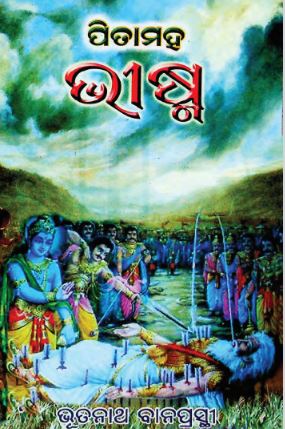Pitamaha Bhisma is a captivating mythological novel penned by eminent Odia author Bhutnath Banaprasthi. With a deep-rooted interest in exploring timeless tales from India’s ancient epics, Banaprasthi revisits the Mahabharata’s iconic character, Bhisma, in this compelling literary work. Published in 2011, the novel delves into the life, struggles, and enduring legacy of Bhisma, who is a paragon of virtue, duty, and sacrifice.
The narrative is structured to transport readers through a rich tapestry of events, setting the stage within the hallowed pages of the Mahabharata, where Bhisma stands as a central figure. The tale begins by chronicling Bhisma’s auspicious birth as Devavrata, the son of King Shantanu and River Goddess Ganga. Banaprasthi deftly illustrates the pivotal moments of Bhisma’s early life, including his ascetic education under the guidance of sages, his masterful acquisition of arms, and his unwavering filial devotion.
One of the novel’s defining moments illuminates Bhisma’s extraordinary vow of celibacy and relinquishment of the throne, conducted out of sheer selflessness to ensure his father’s happiness. Banaprasthi’s vivid descriptions and emotive language render this turning point not merely a sacrifice but an act of unparalleled nobility that reverberates through the chapters, underscoring Bhisma’s commitment to Dharma (righteousness)
As the story progresses, Banaprasthi delves into the complex web of Kuru dynasty politics, presenting Bhisma as a steadfast pillar amidst the raging storm of familial discord and alliance negotiations. Bhisma’s role as the grandsire in the Mahabharata epic is explored with nuanced sensitivity, capturing his struggle to uphold Dharma while navigating the treacherous terrain of familial obligations and conflicting duties.
The novel meticulously outlines key episodes, such as the notorious disrobing of Draupadi, where Bhisma’s helplessness and moral dilemmas are palpably portrayed, stirring readers to ponder the excruciating depth of his internal conflict. Banaprasthi’s portrayal of these moments is both empathetic and critical, drawing a multi-dimensional picture of a character often revered yet subject to the vulnerabilities of human fallibility.
Amidst the impending Kurukshetra war, Bhisma’s role as the chief commander of the Kaurava forces is depicted with grandeur and poignancy. Banaprasthi eloquently captures Bhisma’s warrior spirit, strategic prowess, and the internal turmoil of waging war against principles he holds dear. His undying loyalty to his oath, even in the face of potential annihilation, reinforces the gravity of his persona.
The culmination of the novel focuses on Bhisma’s final days on the bed of arrows, bestowed with the boon of choosing the moment of his death. These concluding chapters are rich with philosophical introspection and spiritual profundity, as Bhisma imparts timeless wisdom to Yudhishthira and the Pandavas, thus sealing his canonical legacy within the Hindu ethos.
Bhutnath Banaprasthi’s “Pitamaha Bhisma” is not merely a recounting of mythological events but a masterful exploration of the human spirit, duty, and sacrifice. Banaprasthi’s eloquent prose and insightful storytelling weave an intricate tableau that honors the majesty and moral complexity of Bhisma. The novel serves as a profound tribute to one of the Mahabharata’s most revered characters, offering a poignant reflection on the ideals that continue to resonate through the corridors of time.
Books Info
| Books name | Pitamaha Bhisma/ପିତାମହ ଭୀଷ୍ମ |
| Author | Bhutnath Banaprasthi |
| No Of pages | 140 |
| Publisher | NA |
| Publication | 2011 |
| Printed At | Matrukrupa Printers |
| Distributor | NA |

